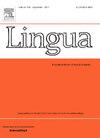The acquisition of grammatical gender in German as an additional language: A comparison of L1 English and L1 Polish learners with and without knowledge of other gendered languages
IF 1.3
3区 文学
0 LANGUAGE & LINGUISTICS
引用次数: 0
Abstract
This study examines the acquisition of lexical and syntactic knowledge of grammatical gender in German as an additional language (Ln) among L1 Polish speakers (whose native language has grammatical gender) and L1 English speakers (whose native language lacks grammatical gender), both with and without proficiency in other non-native gendered languages (primarily Spanish). We tested learners of German as an additional language at lower to upper-intermediate proficiency levels using two tasks: a gender decision task and an acceptability judgment task with correction. Our findings provide consistent evidence for a significant advantage of L1 Polish learners over L1 English speakers in both gender assignment and gender agreement, regardless of German proficiency. Notably, L1 Polish learners do not exhibit lexical gender congruency effects, suggesting that their advantage is not due to gender overlaps between Polish and German. Instead, our results indicate that the mere presence of a grammatical gender feature in L1 facilitates Ln gender acquisition. Additionally, knowledge of other gendered languages heightens learners’ sensitivity to gender agreement violations in German. Finally, participants’ performance varies by case, showing higher judgment accuracy for definite phrases in the nominative but no defaulting to a specific gender.
德语作为一种附加语言的语法性别习得:具有和不具有其他性别语言知识的L1英语和L1波兰语学习者的比较
本研究考察了母语波兰语者(其母语有语法性别)和母语英语者(其母语缺乏语法性别)在掌握和不掌握其他非母语性别语言(主要是西班牙语)的情况下,作为附加语言(Ln)的德语词汇和句法知识的习得情况。我们测试了德语作为一门额外语言的学习者在低到中高水平的熟练程度使用两个任务:性别决定任务和可接受性判断任务与纠正。我们的研究结果提供了一致的证据,证明母语波兰语学习者在性别分配和性别认同方面比母语英语学习者有显著优势,无论德语水平如何。值得注意的是,母语波兰语学习者没有表现出词汇性别一致性效应,这表明他们的优势不是由于波兰语和德语之间的性别重叠。相反,我们的研究结果表明,母语中存在的语法性别特征促进了母语性别习得。此外,其他性别语言的知识提高了学习者对德语性别协议违反的敏感性。最后,参与者的表现因情况而异,对主格中的特定短语的判断准确率较高,但没有默认的特定性别。
本文章由计算机程序翻译,如有差异,请以英文原文为准。
求助全文
约1分钟内获得全文
求助全文
来源期刊

Lingua
Multiple-
CiteScore
2.50
自引率
9.10%
发文量
93
审稿时长
24 weeks
期刊介绍:
Lingua publishes papers of any length, if justified, as well as review articles surveying developments in the various fields of linguistics, and occasional discussions. A considerable number of pages in each issue are devoted to critical book reviews. Lingua also publishes Lingua Franca articles consisting of provocative exchanges expressing strong opinions on central topics in linguistics; The Decade In articles which are educational articles offering the nonspecialist linguist an overview of a given area of study; and Taking up the Gauntlet special issues composed of a set number of papers examining one set of data and exploring whose theory offers the most insight with a minimal set of assumptions and a maximum of arguments.
 求助内容:
求助内容: 应助结果提醒方式:
应助结果提醒方式:


